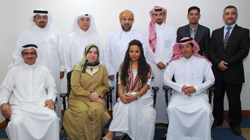

The Institute of Public Administration (BIPA) has received the team in charge of preparing, studying and evaluating the impact of training and consultative research on administration development in the Gulf Cooperation Council (GCC) countries, in order to develop a mechanism of action and implementation schedule of the study, which is considered the first of its kind in the Gulf region. The study aims to assess the impact of training, research and consultation on administration development in the GCC countries, in order to recognize and identify deficiencies and recommend solutions, which would be reflected positively on enhancing organizational performance in the Gulf.
The Executive Director of Development and Learning at BIPA Mr. Ishaq Ameen indicated that the team, which is consisting of institutes of public administration and administration development in the Gulf, was formed based on a decision issued by the Directors Generals of Institutes of Public Administration and Administration Development at their 14th meeting, which was held in the Kingdom of Bahrain last April.
Mr. Ameen also indicated that at the invitation of the GCC’s Secretariat, the team first meeting was held last August at the Secretariat headquarters in Riyadh. Where the schedule and the agenda of the meeting were approved, agreeing that the mission requires completion of two important essential tasks; first studying and evaluating the impact of training from the standpoint of the institutes and government agencies in the GCC countries, secondly the impact of research, studies and consultation on administration development from the point of view of institutes and government agencies in the GCC countries, in addition to the preparation of appropriate mechanisms, so long as the team to finish its work within a period not exceeding four months to comply with the standards set by the document of principles of GCC joint action.
Mr. Ameen said “During the first meeting, the team members agreed to use more than one tool of measurement in order to increase the credibility of the results, where qualitative method was used that depends primarily on carrying out interviews with the directors of training, research, studies and consultation in the Institutes of Public Administration to answer the reality of measuring its impact on development. Also, the qualitative method relies on the use of semi-codified questionnaires with those responsible for measuring the impact of training, research, studies and consultation in government sector, to know in what manner they measure the impact and determine the effect of training, research, studies and administrative consultation on administration development. Finally, the quantitative method through the analysis of documents that have been obtained from directors of institutes or government agencies, either about measurement of the impact of training or research or consultation.”
At the second meeting, which was held in Bahrain earlier, Mr. Ameen elucidated about the exploratory visit to BIPA by the team to learn about the services provided, and the mechanisms of action, as well as meeting with officials to gather the necessary information for the study. Also, Mr. Ameen highlighted the team's extent of commitment and keenness to end this study in a timely mode and deliver a detailed report in December, praising the significant role played by the team who was distinguished in gathering information and preparing frameworks and mechanisms in an accurate manner, which will reflect positively on the accuracy of the study to achieve the set objective.
Moreover, Mr. Ameen emphasized that the field visits furnished the team with a great opportunity – besides collection of information – to identify the distinct experiences of the Gulf institutes, and the exchange of ideas and issues of common interest, thereby helping to solve problems and learn from the successful experiences.
For their part, the visiting team commended the organization and the volume of work carried out by the institute, which reflects the keen interest of the Kingdom of Bahrain in training, consultancy and research.
It is worth mentioning that the team had visited Qatar, Kuwait, United Arab Emirates and Bahrain to meet with officials in training institutes, and the visits will be completed by going to Oman and the Kingdom of Saudi Arabia. After completing the first phase by meeting with directors generals in the institutes of administration, the team will shift to the second phase which is the collection of information through questionnaires that will be distributed to the beneficiaries of institutes' services in the Gulf countries, to measure the impact of programs and services offered by the institutes to the beneficiaries.
